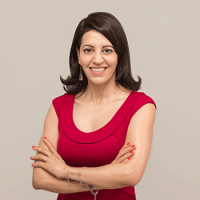Digital Activism in MENA: Protecting Voices for Change Online
Submit a question
The Middle East Program and Science and Technology Innovation Program hosted a group of practitioners to highlight the work of activists in the Middle East and North Africa (MENA) region who leverage digital mediums to raise awareness and educate peers on liberal democratic values. The timely discussion focused on the challenges these activists face, particularly in a new era of authoritarian regimes working with tech firms to identify and silence citizens across the Arab world.
A new landscape for Arab citizens
The digital revolution of the last decade has sparked critical changes across the Arab world. Abdelsalam Akkad noted technology initially granted independent voices a way to speak directly to the public. Soon after, “The issue we faced is Internet created a big chaos in the understanding of the government on how to control information. That chaos created a divide.” Eventually the government weaponized technology to shutter independent media organizations and networks. Akkad added that organizations learned to be adaptable to the changing environment. “The content of shows [and] structure of the business itself keep evolving to make sure it keeps running.”
The government’s control over public narratives has led citizens to censor themselves, especially when it comes to what they post online. In turn, “with the lack of freedom of expression [and] evident self-censorship, the social accountability is missing… people are not able to mobilize or provide accountability on their lawmakers,” Sami Hourani commented. This is taking an immense toll on the population’s attitudes towards their country and prospects within in. “Young people are less hopeful about the future,” Hourani added, “In the absence of a social contract where rights are not there, duties are not clear, a sense of belonging is blurry. All of this leads to apathy and despair.”
Human-rights based approach
Technology companies play a controversial role in this new era. On one hand, they generate the tools and infrastructure for authoritarian regimes to silence dissent. On the other, online platforms such as YouTube can be leveraged, “to do the basic thing all human rights lawyers and activists know must happen: document the abuse and make sure the world bears witness,” Malika Saada Saar put forth. In this way, digital mediums serve a greater purpose than entertainment; they are also a resource for exposing bad actors. As technology continues to advance, “it is critical for tech spaces to think through the urgency, need, and imperative of bring [human rights] voices into these spaces.”
Hourani argues to make this a more effective strategy, “it is time to rethink how the tools and methodologies should influence the type of content we put [out]. We need to think about the channels in a different way.” The content must be relatable and interesting to draw an audience, especially among youth. “You cannot influence and mobilize people if it is only the classical way of doing human rights work.”
Stakeholders at all levels must engage in this struggle to counter oppression. Mohamad Najem believes in the power of a ‘peer-to-peer’ community to better understand, “the issues that intersect with our digital life. We need to discuss this. Some of it the government will like, and some the government will not… We are going to support each other when a problem happens.” He calls on citizens at the periphery to engage in dialogue and develop a network of communities that counter dominant narratives.
Speakers



Moderator

Assistant Professor of History and Security Studies, Kansas State University
Hosted By

Middle East Program
The Wilson Center’s Middle East Program serves as a crucial resource for the policymaking community and beyond, providing analyses and research that helps inform US foreign policymaking, stimulates public debate, and expands knowledge about issues in the wider Middle East and North Africa (MENA) region. Read more


Science and Technology Innovation Program
The Science and Technology Innovation Program (STIP) serves as the bridge between technologists, policymakers, industry, and global stakeholders. Read more
